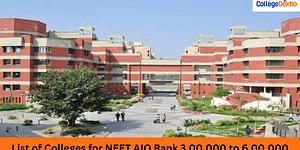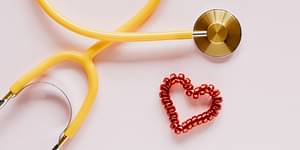MBBS Syllabus & Subjects 2025
MBBS Syllabus & Subjects Overview
The MBBS syllabus 2025 offers an overview of the course structure, and some of the important aspects of the same include Anatomy, Biochemistry, Physiology, Pharmacology, Community Medicine, Dermatology and Venereology, Surgery, Orthopaedics, etc. The MBBS Course duration is 4.5 years, with a compulsory 1-year internship period. The MBBS Syllabus is divided into 19 MBBS subjects in total, categorized under the 8 semesters, including theoretical and practical chapters.
The syllabus structure is divided into Pre-Clinical, Para-Clinical, and Clinical subjects. The MBBS subjects 1st year consist of three main subjects, while the MBBS syllabus 2nd year comprises seven subjects. In the third year MBBS syllabus, there are three subjects followed by six subjects in the fourth year MBBS. The NMC, or the National Medical Commission, is responsible for curating the MBBS course curriculum.
Table of Contents
- MBBS Syllabus & Subjects Overview
- MBBS 1st Year Subjects
- MBBS Subjects Semester-Wise
- MBBS Syllabus for Pre-clinical Phase
- MBBS Syllabus for Para-clinical Phase
- MBBS Syllabus for Clinical Phase
- MBBS Core Syllabus and Subjects
- MBBS Elective Syllabus and Subjects
- Types of MBBS Specialisations
- MBBS Syllabus - 12-Months Internship
- MBBS Course Structure
- MBBS Projects
MBBS 1st Year Subjects
The year-wise MBBS syllabus, along with the description of the subjects, has been provided below for reference to all interested students:
| MBBS Subjects | Description of Topics |
|---|---|
| MBBS Subjects 1st Year (Semester 1 & 2) | |
| Anatomy | Microanatomy, Embryology and Genetics, Gross Anatomy, and Neuroanatomy. |
| Biochemistry | Molecular Biology, Biological cell, Hormones, Metabolic pathways, Enzymes, Cancer and cancer makers, Biomolecules, Food assimilation and nutrition. |
| Physiology | Respiratory system, Gastrointestinal system, Nutrition, General physiology, Kidney, Nerve-Muscle, Neurophysiology, Blood, Environmental Physiology, Cardiovascular system, Nutrition, yoga |
| MBBS Subjects 2nd Year (Semester 3 & 4) | |
| Community Medicine | Infestations, Infective dermatoses, Ineffective dermatoses, Allergic disorders, Melanin synthesis, Urticaria, Epidermopoiesis, Pathogenesis, Psoriasis, Gonococcal and Nongonococcal infections, HIV infection, Drug eruptions, Dermatological emergencies, Vesiculobullous diseases, Erythema multiforme |
| Pharmacology | General pharmacology, Autacoids, Gastrointestinal and respiratory system, Cardiovascular system, Hormones Miscellaneous, Central nervous system, Autonomic Nervous system, the Peripheral nervous system, Chemotherapy. |
| Pathology | Systemic pathology, General pathology, practical |
| Microbiology | Bacteriology, Microbiology, Virology, Laboratory Diagnosis of viral infection, Common tests for bacterial identification, common laboratory methods for diagnosis of fungal infection, bacterial and viral genetics, collection of transport of samples, microorganism associated with various gastrointestinal infections, sterilisation and disinfection, Gastrointestinal infection caused by different parasites, Mycology, Parasitology, Vaccines, Host-parasite relationship, Immunodiagnosis, Bacterial staining and Cultivation. |
| Forensic Medicine and Toxicology | Toxicology, Forensic Medicine |
| OPD | - |
| MBBS Subjects 3nd Year (Semester 5 & 6) | |
| Community Medicine | Health system of the entire population in a community. This service is provided at various Primary Healthcare centres and is taught in this subject. |
| ENT | ENT or Ear, Nose, and Throat is the field of medicine which is also known as otolaryngology. ENT subjects deal with the treatment and diagnosis of the ear, nose, throat, head and neck area of the human body. |
| Ophthalmology | - |
| MBBS Subjects 4th Year (Semester 7 & 8) | |
| Psychiatry | Psychiatric disorders, Emotion and its affection and application on health, Behavioural sciences, Cognitive process and memory, Schizophrenia, Anxiety neurosis, Bipolar disorders, Personality disorders, Depression, Phobia and OCD |
| Dermatology and Venereology | Health education, Environment, Behavioural Sciences, Nutrition, Biostatistics, Rehabilitation, Epidemiology, Important National Healthcare Programs, Health Administration, Epidemiology of communicable diseases and non-communicable diseases, Counselling maternal and child health, Geriatrics, Health Economics. |
| Paediatrics | Growth and development, Respiratory system, Vital statistics, Nutrition, Infectious diseases, Immunisation, Hematology, Gastro-intestinal tract, Cardiovascular system, Central Nervous system, Behavioural systems, Neonatology, Fluid-electrolyte, Paediatrics emergencies, Genetics, Therapeutics, Genito-urinary system, Paediatrics Surgical problems. |
| Anaesthesiology | Cannulation, Preoperative evaluation and optimisation, Nasopharyngeal or Oropharyngeal Airway insertion, Skills I/V, Attaching pulse oximeter, Bag-Mask ventilation. BP cuff, and ECG electrodes, setting up a monitor. |
| Orthopaedics | Orthopaedic Oncology, Orthopaedic Neurology, Paediatrics orthopaedics, Sports Medicine, Management of Trauma, Physical medicine and rehabilitation, Radiology, Disorders of Spine, Fracture |
| Obstetrics and Gynaecology | Obstetrics, Gynaecology, Basic Sciences, Neonatology and its recent advances, contraception |
MBBS Subjects Semester-Wise
The MBBS subjects semester-wise have been elaborated below for reference to all interested students:
MBBS Subjects Semester 1 | |
|---|---|
| Anatomy | Biochemistry |
| Physiology | - |
MBBS Subjects Semester 2 | |
| Anatomy | Biochemistry |
| Physiology | - |
MBBS Subjects Semester 3 | |
| Community Medicine | Forensic Medicine |
| Pathology | Pharmacology |
MBBS Subjects Semester 4 | |
| Microbiology | Clinical postings in wards |
| Practical | - |
MBBS Subjects Semester 5 | |
| Community Medicine | Medicine and allied subjects |
| Obstetrics and Gynaecology | Paediatrics |
MBBS Subjects Semester 6 | |
| Obstetrics and Gynaecology | Paediatrics |
| Surgery and allied subjects | Clinical postings |
MBBS Subjects Semester 7 | |
| Obstetrics and Gynaecology | Paediatrics |
| Surgery and allied subjects | Community Medicine |
MBBS Subjects Semester 8 | |
| Internship/Residency | - |
MBBS Syllabus for Pre-clinical Phase
- The preclinical phase of syllabus is spread across the first two semesters of the MBBS course and different subjects that are taught in this phase are Anatomy, Biochemistry, and Physiology.
- Students at this stage also have to conduct practicals on various subjects such as Gross anatomy, Microanatomy, Embryology, Genetics, Neuroanatomy, etc. as a part of the MBBS syllabus.
MBBS Syllabus for Para-clinical Phase
- The paraclinical phase begins from the second year of the MBBS course and it consists of different MBBS subjects such as Pathology, Pharmacology, Forensic Medicine, Toxicology, Microbiology, etc.
- At this phase, candidates are also introduced to community medicine as a part of the MBBS course.
- At the paraclinical stage the MBBS subjects are spread over three semesters- third to fifth.
- During the para-clinical phase of the MBBS course, students are also posted in different wards of the hospital and need to take up OPD responsibilities.
MBBS Syllabus for Clinical Phase
- Students begin studying community medicine from phase 2 of their MBBS syllabus and course.
- Students also learn about medicine and different allied MBBS subjects like dermatology, psychiatry, obstetrics, gynaecology, etc.
- Candidates at this stage also gain knowledge about surgery and its allied fields like Anesthesiology, ENT, Ophthalmology, Orthopaedics, etc.
- The clinical postings of candidates continue throughout the clinical stage.
There are exams in the MBBS course which is scheduled in three different phases:
- First, the Professional Exam, which takes place at the end of the second semester.
- Second, the Professional Exam at the end of the fifth semester.
- Final, Professional Exam, which takes place at the end of the ninth semester.
MBBS Core Syllabus and Subjects
Here are the MBBS core subjects that students are required to study during their MBBS course:
| MBBS Core Subjects | |
|---|---|
| Medicine | Orthopaedics |
| Community Medicine | Gynaecology |
| Ophthalmology | Paediatrics |
| Surgery | Casualty |
| Otorhinolaryngology | - |
MBBS Elective Syllabus and Subjects
Check the list of MBBS elective subjects:
| MBBS Elective Syllabus and Subjects | |
|---|---|
| Dermatology and Sexually Transmitted Diseases | Psychiatry |
| Tuberculosis and Respiratory Diseases | Anaesthesia |
| Radio-diagnosis | Forensic Medicine and Toxicology |
| Blood Bank and Transfusion | Physical Medicine and Rehabilitation |
Types of MBBS Specialisations
There are many specialisation offered by MBBS such as:
- General Medicine
- General Surgery
- Paediatrics
- Obstetrics and Gynaecology
- Dermatology
- Orthopaedics
- ENT
- Psychiatry
- Anaesthesiology
- Plastic Surgery
- Neuro Surgery
- Cardio-Thoracic surgery
- Paediatric Surgery
- Gastroenterology
- Endocrinology
- Clinical Haematology
- Nephrology
- Cardiology
- Immunology
- Craniologist
- Pathologist
MBBS Syllabus - 12-Months Internship
The MBBS course consists of a 12 months of compulsory rotating internship in any hospital or healthcare centre. Completing this internship is crucial for students to get hands-on experience and skill enhancement.
During this period, candidates also get to focus on their interpersonal skills and communication skills by talking to patients and coming up with a diagnosis with their professional knowledge.
The concerned medical department provides students with a logbook of their own and their posting keep changing during intervals. It is also notified by the respective departments. The period of posting is stated as specified below:
| Speciality | Duration |
|---|---|
| Medicine | 1.5 months |
| Surgery | 1.5 months |
| Rural | 3 months |
| Paediatrics | 1 month |
| Obstetrics and Gynaecology | 1 month |
| Casualty | 1 month |
| Anaesthesiology | 15 days |
| Ophthalmology | 15 days |
| Elective ` | 2 months |
| Total duration | 12 months |
MBBS Course Structure
The entire MBBS syllabus and MBBS course is divided into 23 specialisations, nine compulsory subjects and 8 elective subjects. MBBS course’s theoretical aspect focuses on different things such as human anatomy, medicine, and surgery.
An MBBS course begins with the process of familiarising students with the advanced medical terminology while training them on various fundamental concepts of surgery. Internships are extremely important and are promoted as a part of the MBBS course so that students get to understand surgeries, different medical procedures and patient care management.
Workshops and internships are a part of each semester so that students are prepared for a career in the healthcare field.
Topics that are covered in the MBBS course are:
- 23 specialisation
- 9 compulsory subjects
- 8 elective subjects
- Projects and dissertation
- Practical sessions
- Internships and workshops
- Conferences
MBBS Projects
MBBS course is heavily project based and candidates get hands-on experience from the course and are prepared to work in challenging environments in the healthcare industry. Some of the common MBBS Project topics include:
- Epidemic versus Pandemic
- Child Health Care
- Medical humanitarian mission in the developing countries
- Homoeopathic medicine- the placebo effect
- Virus infections, its causes and treatments


















